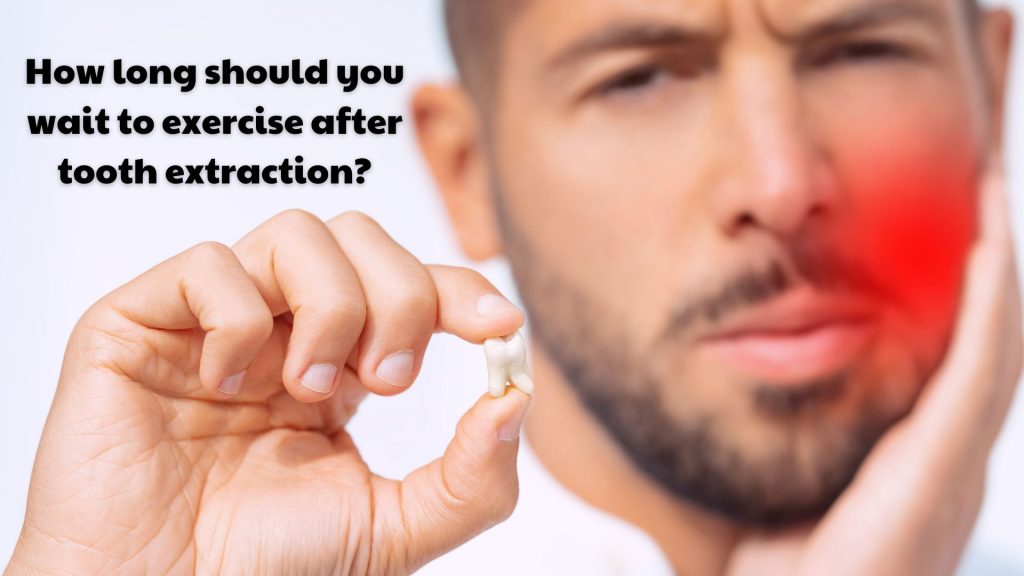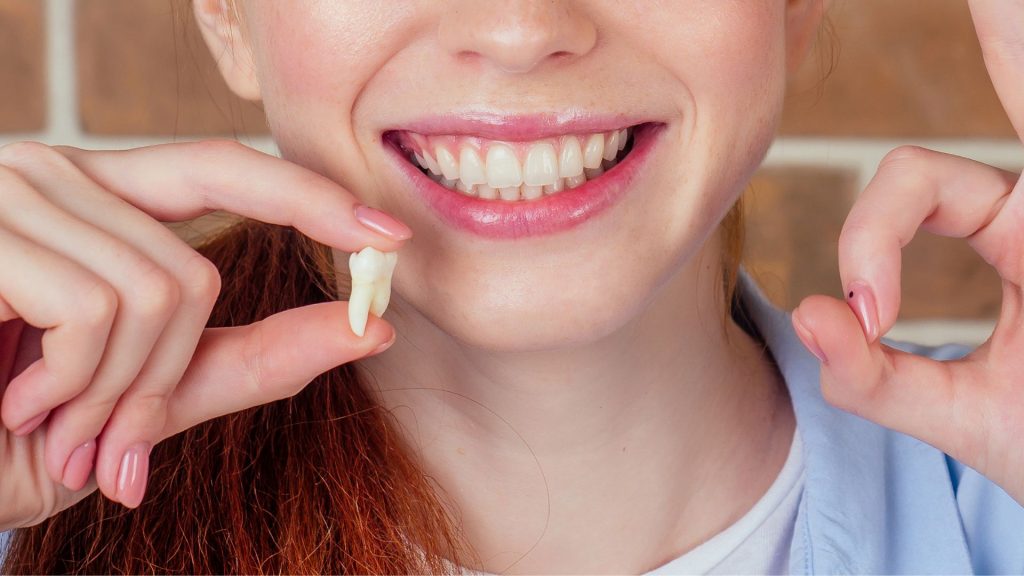How long should you wait to exercise after tooth extraction? Don’t hit the gym for at least 3 days. Tooth extraction is a frequent medical treatment, and the body requires time to heal and recover. This is particularly crucial if you plan on engaging in strenuous physical activity soon after getting a tooth out. This article discusses the best period to exercise following a tooth extraction. We’ll learn about the area’s healing following tooth extraction and key elements to consider while making a choice.
How Long Should You Wait To Exercise After Tooth Extraction?


After tooth extraction, wait 3-5 days before exercising. Don’t rush back to the gym until you’ve given the area around your removed tooth a chance to recover. The region surrounding the extraction site will be red, swollen, and painful immediately after tooth removal. Immediately after surgery, your body must prioritize the wound healing and regeneration process. Exercising too soon might cause bleeding, injure the tooth extraction site, and impede recovery.
In short, your orthodontist or dentist will advise you on exercise waiting times based on your surgery’s intricacy and health state. To recuperate safely, follow your dentist’s orders.
Ideal Waiting Time
Exercising following extraction is recommended no sooner than 72 hours after the procedure. It takes this long for the wound to renew and heal. To heal and regrow tissue after an extraction, the surrounding region requires time. In particular, wound blood clots prevent and halt bleeding.
Over the following 72 hours, tissue regeneration and revascularization will enable new tissue to form and replace the injured region. The waiting period allows the thrombus and new tissue to settle and attach to the incision, preventing bleeding and irritation. The optimum waiting interval before activity helps prevent wound pressure and promote the greatest recovery. Depending on the extraction’s intricacy and the patient’s health and recuperation, waiting durations might vary.
Therefore, you must follow your orthodontist or dentist’s advice to exercise safely and efficiently.
Post-Tooth Extraction Wound Healing
Wound healing following tooth extraction is normal and difficult. The tissue and blood vessels around a tooth extraction site are destroyed, causing a wound. Then, self-healing and tissue regeneration begins to repair the wound. After tooth extraction, these are the primary wound healing stages:
- Thrombosis: After tooth extraction, a thrombus forms. This thrombus stops bleeding and prevents infection. Wound healing begins here.
- Inflammatory phase: The wound will swell and become crimson a few hours following tooth extraction. The initial stage of inflammation involves blood, white blood cells, and antimicrobial substances protecting the wounded region.
- Tissue Regeneration and Vascular Reconstruction: Tissue remodeling and revascularization begin 48 hours following tooth extraction. New blood vessels and cells repair injured tissue.
- Healing phase: The wound and swelling will start to heal after 7-10 days. New tissue will fully cover the incision and become mucosal tissue.
Why Wait After Extraction To Exercise?
Healing after tooth extraction is crucial to your health and safety. After tooth extraction, the wound region must heal and renew. Thus, exercise must be delayed. We’ll discuss why waiting is vital and the healing process following tooth extraction in this part.
- Wound healing process: The wound’s vicinity will require time to heal after evacuation. After tooth extraction, blood clots must form to protect the wound. Early exercise might disrupt the blood clot, produce bleeding, and injure the wound, delaying recovery.
- Risk of infection: Exercising too soon after extractions may infect wounds. After surgery, the wound is open and susceptible to infection. Before exercising, protect and heal the wound to prevent infection and irritation.
- Pain and swelling: Exercising too soon might worsen tooth extraction pain and discomfort. This might hinder healing and make exercises unpleasant.
- Physical impact: Exercise following tooth extraction might put a strain on the incision. Pressure may cause bleeding, tissue injury, and healing issues.
In conclusion, waiting before exercising following extraction allows the body to recover safely and effectively.
Suggest Post-Extraction Sports


To avoid wound irritation after tooth extraction, exercising should be done carefully. You may undertake some mild sports or activities shortly after the extraction. Immediately after tooth extraction, the following sports are recommended for training:
- Yoga and Pilates: After tooth extraction, light yoga or Pilates for stretching and relaxation may be done. So, avoid strenuous exercises and motions.
- Walk: Walking is a kind of wound. To keep moving without affecting recovery, walk carefully.
- Light upper body workouts: You may train upper body muscles including arms, shoulders, back, and abs. To avoid stressing the injury, avoid running or leg activities.
Please see your dentist or orthodontist before beginning any workout routine after tooth extraction. You may trust their assessment of your progress, and follow their tailored recommendations to exercise safely and successfully.
Avoid Sports Before Tooth Extraction
After tooth extraction, avoid vigorous sports or activities that push on the wound. These sports may injure or slow recovery. Post-tooth extraction sports should avoid:
- Physical contact sports: Football, basketball, tennis, badminton, and martial arts should be avoided after extraction. These sports may harm wounds.
- Jogging and other high-speed running activities: They rapidly might exert pressure on the wound, causing swelling, discomfort, or irritation.
- Lower body muscle training: Avoid working legs, thighs, and calves at this time. These workouts may raise wound pressure and slow healing.
- Skydiving, rollerblading, and jumping activities: Parachuting or rollerblading activities can have a negative effect on the wound area after tooth extraction.
- Swimming: Although swimming may seem like a gentle activity, swimming water can wash away the wound area and put it at risk of infection.
In short, avoid improper sports post-extraction by following your orthodontist’s advice. Always consult with your doctor to determine how long you should avoid these activities.
Treatment After Extraction


Taking good care of yourself after getting a tooth extracted can help you heal more quickly and reduce your risk of infection. After the extraction, follow these instructions:
- Rest: To let the wound heal, avoid intense exercise for 72 hours following extraction.
- Apply gauze: Maintain the wound thrombosis after tooth extraction. Stops bleeding and protects a wounded area to prevent chewing, sucking, or violently cleaning your mouth for 24 hours following a tooth extraction to prevent upsetting the mass acupoint.
- Control swelling: The day following tooth extraction, apply a cold compress or ice pack to the site for 15-20 minutes every 2-3 hours to minimize swelling.
- Eat right: Avoid hot, spicy, or hard meals like rice, bread. Consume soft, easy-to-eat foods like yogurt, ice cream, oatmeal, soup, soft fruit, or juice the day following tooth extraction.
- Wash your mouth gently while healing: Avoid over-scrubbing the wound to avoid damaging the mass acupoint and losing the thrombus.
- Dental check-ups: Call your dentist if you have significant bleeding, discomfort, or persistent swelling.
Conclusion
Waiting for the recommended period before exercising after a tooth extraction is crucial for the effectiveness and safety of the treatment. After extraction, proper care and following your orthodontist or dentist’s recommendations are crucial to your health and rehabilitation.
At the Spring Orchid Dental Center, your health and comfort are our top priorities. We recognize that each situation is unique and needs specific attention. Our physicians and staff will advise you on post-extraction care, including whether to exercise.
So, put your faith in Spring Orchid Dental; you will get attentive attention and expert counsel. We care about the extraction and the rehabilitation thereafter. Workout waiting times, appropriate sports, and wound care will be explained.
FAQs
Can You Play Basketball After Tooth Extraction?
No, you shouldn’t play basketball right after getting a tooth pulled. Basketball is a contact sport that puts stress on jaw muscles and teeth. The incision and surrounding tissue require time to heal after tooth extraction. The wound may be sensitive following tooth extraction. Basketball may cause painful bumps, collisions, and bleeding. In addition, the instability of blood clots in the wound region may be decreased by playing basketball, leading to infection and a prolonged healing time.
Is School PE Exempt For Tooth Extraction?
Whether or not a student may skip PE after having teeth extracted is up to the discretion of the school and local rules. In some situations, a student can get excused from physical education class if they just had a tooth pulled and need time to heal.
However, you must obtain a statement from your orthodontist or dentist stating that you have had your teeth pulled and need time off to recover to be excluded from physical education class. After tooth extraction, you may be excluded from physical education if the school approves.
However, a teacher or school administrator must supervise the PE exemption for safety and health reasons.
Why Are You So Tired After Tooth Extraction?
Feeling tired or fatigued after a tooth extraction is not uncommon, and there are several reasons why this could be happening:
- Anesthesia and Medications: Local anesthetic or sedative may have made you sleepy following tooth extraction. Also, tiredness can be a side effect of painkillers or drugs that your doctor gave you after the extraction.
- Physical Stress: Tooth extraction is physically demanding. Post-surgery weariness is caused by the body’s normal healing reaction.
- Pain and Discomfort: After tooth extraction, pain, and discomfort may make it hard to sleep, making you fatigued.
- Blood Loss: Tooth extractions are usually mild, however, they sometimes bleed. Minor blood loss might cause weariness.
- Reduced Caloric Intake: After tooth extraction, you may choose softer or liquid meals, reducing calorie intake and energy levels.
- Inflammation and Healing: Inflammation and the healing process might make you sleepy.
In short, if your weariness remains or worsens, see your dentist or oral surgeon.
Contact Now!
Contact us today to schedule an appointment and learn more about extractions and the restorative process. We will accompany you on the path to health and recovery after tooth extraction. Spring Orchid Dental- Take care of your smile, take care of your health!





